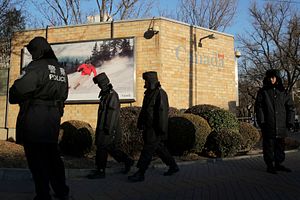It has been seven months since Huawei executive Meng Wanzhou was arrested in Vancouver by Canadian authorities at the request of the U.S. Department of Justice. Meng is alleged to have been personally complicit in providing false assurances that Huawei was not evading the financial sanctions the United States had placed on Iran. She is currently released on bail awaiting her extradition proceedings, due to begin in January next year. The case could take up to a year to complete.
In response to the arrest of Meng, Chinese authorities arbitrarily detained two Canadian citizens, businessman Michael Spavor and former diplomat Michael Kovrig, hoping to use hostage diplomacy pressure Ottawa into releasing Meng. It is believed that the revised sentence for Canadian drug-trafficker Robert Lloyd Schellenberg — from 15 years to the death penalty — was also in retaliation for the arrest of Meng. In May, China formally arrested both Spavor and Kovrig, accusing the pair of stealing state secrets. Beijing has provided no details as to the particulars of their alleged activities.
In a further attempt to place pressure on Ottawa, Chinese importers are currently refusing to purchase Canadian canola seed, citing the presence of pests in a number of previous shipments. Canadian inspections have revealed no issues with the seed. The import ban is seemingly a direct insult to Canadian Foreign Minister Chrystia Freeland, who took a jar of canola from her father’s farm to China in 2016 in order to emphasize the importance of the crop to Canada. Canadian canola seed exports to China were worth $2.7 billion in 2018.
Relations between Ottawa and Beijing have deteriorated to the point where Canadian officials are unable to contact their Chinese counterparts. It was revealed last week that the Chinese government ignored a personal attempt by Canadian Prime Minister Justin Trudeau earlier this year to arrange a conversation with Chinese Premier Li Keqiang. Freeland has stated that she has repeatedly tried and failed to secure a meeting with her counterpart, Chinese Foreign Minister Wang Yi. Neither country currently has respective ambassadors in place, with Canada’s ambassador to Beijing having been fired due to his handling of the situation, and China’s ambassador to Ottawa given a promotion to Paris for his.
China’s forceful response to the arrest of Meng provides a telling indication that the links between Huawei and the Chinese government are potentially very strong. If so, the suspicion of (among others) the United States and Australian governments toward Huawei’s involvement in critical communications infrastructure like new 5G networks — where sensitive information could be obtained and transferred to Beijing — has been justified.
Alongside these suspected links to the Communist Party, there is powerful national pride in China associated with the firm that seems to be driving Beijing’s behavior. As a company at the forefront of technological innovation like 5G, Huawei is a symbol that China has made an important shift from being a country that simply builds other people’s ideas, to an ideas economy itself, further illustrating China’s ascension (or reascension) to great power status. Meng’s arrest is seen to be another attempt to thwart China’s rightful place in the world.
However, while Beijing may feel its growing economic and political might can be used to bully Ottawa into rescinding its treaty obligations to the United States by releasing Meng, it is failing to understand just how integral these obligations are to Canada, and how foolhardy Canada would be to break them.
Over three-quarters of Canada’s exports go to the United States. Each day $1.8 billion in goods and services traverses their shared border, as do 400,000 people. The two countries have deeply integrated governmental structures, highly coordinated defense and law enforcement systems, as well as shared airspace, maritime spheres, and ecosystems. Simply put: There is no Canadian policy, foreign or otherwise, that is not intrinsically linked to cooperation with the United States. Maintaining this cooperation, and the trust that it is built upon, is Canada’s strategic imperative.
This alone would make it impossible for Beijing to intimidate Canada into releasing Meng, but the principles of adhering to the rule of law, and not rewarding the act of hostage taking, makes Canada’s resolve essential for preventing the normalization of Beijing’s tactics. As former Canadian Ambassador to China David Mulroney noted, if Ottawa were to simply release Meng, then — as a country that had always enjoyed a reputation for integrity — Canada would be giving up much more than just the Huawei executive.
While Meng is sure to receive a fair and interference-free extradition hearing next January, the situation for Kovrig, Spavor, and Schellenberg remains opaque. Trudeau is set to meet with U.S President Donald Trump in Washington this week, and he is expected to request U.S assistance in securing the release of Kovrig and Spavor, and the prevention of the death penalty for Schellenberg. Given the concern Beijing has exhibited toward Meng’s arrest it seems doubtful that the United States could exert enough pressure on the Chinese leadership to shift their approach.
With the forthcoming G-20 Summit in Osaka, Japan, Trudeau will be hoping to secure a meeting with Chinese President Xi Jinping to at the very least discuss the situation. Yet China seems to be using access to its leadership as a reward for compliant behavior, which indicates Xi will not acquiesce to a formal meeting with Trudeau. The Canadian prime minister may instead have to use his agility to gain an informal conversation with the Chinese leader.
































